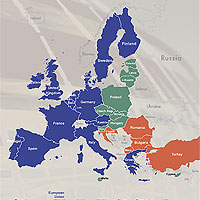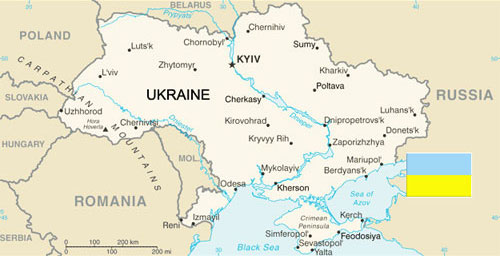Yanukovych backed into corner as EU suspends talks

(Business New Europe – bne.eu – KYIV BLOG – December 16, 2013) Some 100,000 protestors rallied on Independence Square (Maidan Nezalezhnosti) in central Kyiv for the third Sunday in a row this weekend, maintaining the pressure on the increasingly embattled President Viktor Yanukovych. They were treated to a speech by US Senator John McCain and a gig by Ukrainian rock legends Okean Elzy, but the headliner was the EU’s decision to freeze talks with the administration for negotiating in bad faith. The decision backs Yanukovych into a corner as he prepares to fly to Moscow for what should be crucial meetings with Russian President Vladimir Putin.
EU enlargement chief Stefan Fuele said by Twitter on December 15 that the EU was suspending work on the free trade and association agreement with Ukraine because Kyiv’s promises to find a compromise had “no grounds in reality”.
“#Ukraine: Words & deeds of President &government regarding #AssocAgreement further & further apart. Their arguments have no grounds in reality,” tweeted Fuele, who added that he told Ukraine Deputy Prime Minister Serhiy Arbuzov, who was in Brussels for talks, that any further negotiations were conditional on a “clear commitment to sign,” to which Arbuzov “had no answer.”
RFE/RL spoke by telephone to Peter Stano, the spokesman for Fuele: “There is more and more discrepancy or there is a growing gap between the deeds and words of the Ukrainian President. [Stefan Fuele] told [Ukrainian] Deputy Prime Minister [Serhiy] Arbuzov when he was in Brussels last Thursday and (December 12) and also in their subsequent conversations later that the continuation of our work is conditioned with clear commitment of Ukraine to sign the Association Agreement. Since there was no response to this [from Ukraine] the work and the discussions are being put on hold.”
Demonstrations erupted after Yanukovych failed to sign off on the long-expected EU deal during a summit in Vilnius on November 28-29. Since then, the president has said the government still intends to join Europe and could possibly sign the agreement in the spring if the EU comes up with more “compensation.” However, Yanukovych’s comments have been met with widespread scepticism, especially on Maidan. The EU’s decision to suspend talks only confirms that view.
It seems that Yanukovych’s tactic to attempt to play the EU off against Russia to gain more money and other concessions has backfired. Now the EU’s refusal to discuss the deal further has backed Yanukovych into a corner. He is due in Moscow on December 17 and now has only one negotiating partner – Russian President Vladimir Putin. Given the parlous state of Ukraine’s economy, he will be forced to make concessions, and top of Putin’s wish list is Ukraine’s membership of rival trade club the Customs Union. Indeed, Prime Minister Mykola Azarov suggested over the weekend that the terms of a Russian deal have already been agreed with the Kremlin.
Former economy minister Arseny Yatsenyuk, one of the opposition leaders, declared: “[Yanukovych] might as well stay in Moscow and not come back to Kyiv if a Customs Union agreement is signed… We’ll give him a really warm welcome if he sells out Ukraine.”
To drum in the point during the mass rally on Maidan on December 15, the crowd voted to forbid the president to sign a deal with Russia. This is awkward for everyone, as it will be taken as the basis for breaking the agreement if or when Yanukovych is voted out of office in 2015, which is looking increasingly likely. If Putin does get Yanukovych’s signature on the Customs Union deal, it could end up being a short-lived and Pyrrhic victory.
The EU made it clear that the Ukraine is welcome to ask for a deal again at any time, as all the hard work has already been done. Simon Smith, the British Ambassador to Ukraine, tweeted on December 15: “EU has pulled out of nothing. Negotiation of #AssocAgreement ended 1+ years ago, when both sides initialled. EU door is open.”
The same point has been made by Polish lawmakers involved in the talks, who pointed out last week that in the last few years the Ukrainian delegation has initially every single page of the Association Agreement and all the details have been agreed.
What pushed the EU to act so decisively for once is probably Ukraine’s continued dithering on a last-ditch attempt by the EU to close a deal. Top EU diplomat Catherine Ashton was in Kyiv last week and almost certainly offered Yanukovych improved terms, although no details have been released. A delegation from Ukraine was in Brussels over the weekend, but obviously the talks went nowhere so the EU decided to pull the plug.
Yanukovych is now facing a Hobson’s choice: sign a deal with Moscow, stave off economic collapse and lose the 2015 presidential elections, versus no deal with the EU.
McCain in town
US Senator John McCain joined the list of visiting dignitaries who offered his support and grabbed the chance to have a photo-op with the revolutionary leaders. The Polish Foreign Ministry has reportedly also set up a tent on Maidan to show its solidarity with the demostrators.
“We are here to support your just cause, the sovereign right of Ukraine to determine its own destiny freely and independently. And the destiny you seek lies in Europe,” said McCain from the stage in Maidan, to roars of appreciation.
However, his extremely short speech was long on sentiment but peppered with logical inconsistency, which serves to illustrate how the whole Euromaidan demonstration is worsen relationing between east and west. “We … want to make it clear to Russia and Vladimir Putin that interference in the affairs of Ukraine is not acceptable to the United States,” said McCain, blithely ignoring the fact that his very presence and his overt support for the opposition will be seen as exactly the interference in Ukrainian politics he is accusing Russia of.
Moveover, while Washington has accused Russia of “bullying” Ukraine, there doesn’t seem to be a problem with US State Department department spokeswoman Jen Psaki telling reporters last week: “All policy options, including sanctions, are on the table, in our view, but obviously that still is being evaluated.”
Senator McCain gave CNN an interview from Kyiv where he compounded the contradictions with a litany of fluffy statements. In one breath, McCain was talking about Putin’s pressure on Ukraine (the details of which he didn’t seem to be clear on naming only unspecified “threats”) and in the next he was telling CNN’s Candy Crowley: “We are not talking about military action, we are not talking about blockades. We are talking about the possibility of sanctions, if they continue to brutally repress their people. That would require some action on our part, just because that is what the United States of America is all about.”
The Russian state-owned RT news channel has gleefully being playing on the inconsistencies with this attitude for a week, running footage of US police beating protesting American college students and shooting pepper spray into their faces at point blank range during the Occupy movement last year.
Democratic problem
All the talk of supporting “democracy” brings up the salient point and the nub of the problem that the protestors on Maidan are facing. Ironically, if the US is committed to supporting democracy in Ukraine, it should support Yanukovych who is, after all, the democratically elected leader, narrowly winning the post in 2010 in what was probably Ukraine’s most democratic election ever held.
Procedurally there is no legal mechanism to remove a president halfway through his term simply because some people don’t like him any more. It’s a very nasty problem indeed. Supporting a change of government because a large crowd demands it is democratic in the broadest sense, but using sanctions to oust a legally elected president of a country clearly divided undermines democracy in a narrower sense of how a democratically organised society is supposed to work.
McCain glossed over these philosophical problems and justified the US’ threats by referring to the “brutal repression” of the state. However, the demonstrations have been remarkably peaceful (so far). There was a clash with police on November 30, where dozens of protestors were injured and ten people arrested (who were all released over the weekend), but this hardly counts as “brutal repression” when compared to some other regimes in the region like Uzbekistan, a US ally.
You could also justify breaking off relations with Ukraine on the grounds of corruption, as Yanukovych and his “family” clique have been systematically robbing the country blind since taking office. Ukraine overtook Russia to officially become “the most corrupt country in eastern Europe” in Transparency International’s most recent “Corruption Perspectives Index”. However, up until three weeks ago the EU was happy to ignore this fact and was falling over themselves to persuade Ukraine to join its trade club.

